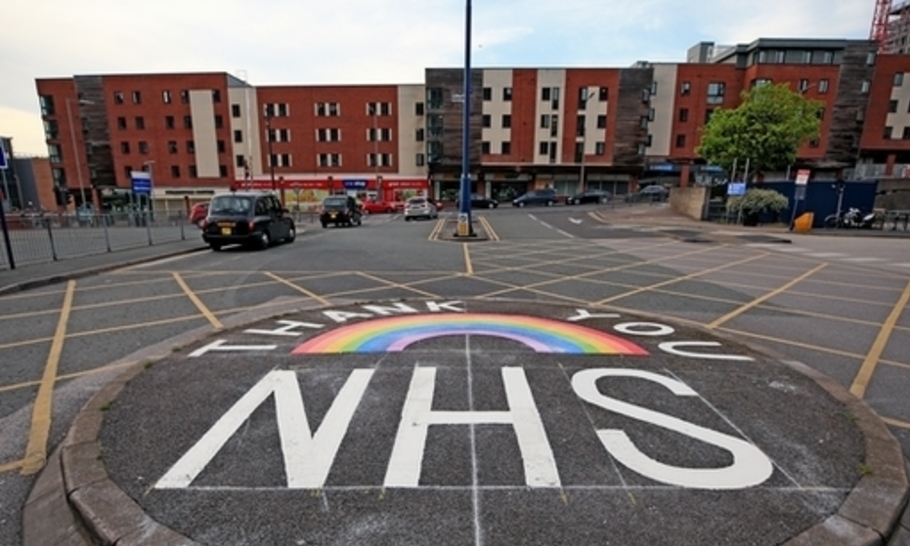The NHS deserves applause — and also reform

Peter Byrne/PA Wire/PA Images
This evening my family and I will finish up our supper quickly to be in time to stand in our front garden and clap and cheer wildly. Many of our neighbours in our modest terraced street in Fulham will do the same. It has, of course, become the weekly “call for carers” ritual. Sometimes if my wife is feeling particularly keen she will get a saucepan and bang it — something I feel is something of a continental touch.
It is a custom that the Queen endorsed in her broadcast message about coronavirus when she said: “The moments when the United Kingdom has come together to applaud its care and essential workers will be remembered as an expression of our national spirit.”
The mood is good-humoured. Rather than pious or “virtue signalling” there is a bit of self-deprecating chuckling. A slight embarrassment that suggests our sense of English reserve is still somewhere beneath the surface. It also provides a social purpose, a chance to nod and smile at those with whom contact is, of course, greatly restricted. But the gratitude is heartfelt. It is to show appreciation for those who put themselves at risk to save others. Just as a police officer runs towards danger while the rest of us flee to safety. We hope that our modest gesture boosts the morale of those serving in the front line during the current emergency.
I can understand why the practice has its critics. Some dislike feeling pressurised to take part in such activities. There have been instances that have come across as attention-seeking and counterproductive, such as crowds gathering on Westminster Bridge, showing disregard for social distancing rules. I suppose those watching from St Thomas’s Hospital would not know whether to laugh or cry.
Others have expressed political reservations. “Why are we clapping the NHS?” asks Charles Moore in the Daily Telegraph. He adds that “if we are to praise large organisations for how effectively they have dealt with the coronavirus crisis, we should be clapping vigorously for Sainsbury’s, Tesco, Waitrose and Morrisons, who have responded nimbly to sudden extra demand for one of life’s basics — food. We should give only rather tepid applause for the efforts of the NHS to look after another of life’s basics — health.”
But for my part, I am not clapping the NHS as an institution but the doctors, nurses and the many carers, whether employed by the NHS or not. This is not semantics. The distinction is vital. As those very doctors and nurses whom we are honouring this evening know better than anyone, the NHS has been proven to have some very serious shortcomings.
It is quite proper that we compare our circumstances with other countries and consider what explanations there might be for those nations which, so far at any rate, have suffered proportionately fewer deaths than we have. Often the focus is on the lockdowns. Different examples are pointed to by those arguing that we should have started earlier or that lockdowns achieve nothing. The is an important matter to consider.
But might there also be a possibility that, far from being the “envy of the world”, the NHS has served us less well than health services in comparable countries have served their populations?
An analysis by the Deep Knowledge Group, composed of assorted research companies and institutes, has offered a “Treatment Efficiency Ranking” for different countries. It gives points for “speed and frequency of diagnostic monitoring”, “level of access to personal medical supplies” and “size of emergency equipment stockpile”.
Dr Kristian Niemietz of the Institute of Economic Affairs notes: “Virtually none of the countries that do well have fully nationalised, state-run healthcare sectors. Mixed economy systems, which use a combination of private and public provision — and often a mix of private and public funding as well — have an edge over monolithic, monopolistic NHS-type systems.” Germany, which operates with a large number of competing health insurers, came top. South Korea, Japan, Taiwan and Singapore all did well. We did poorly, coming in behind Romania and Bulgaria.
There have been serious miscalculations. To avoid the NHS being overloaded many operations and appointments have been cancelled. Cancer Research UK estimates that 2,300 cancers are being missed every week as a result of breast, cervical and bowel screening being suspended. Professor Karol Sikora warns there could be 50,000 extra cancer deaths. Yet rather than being overloaded the NHS has been less busy than usual. Hindsight is a wonderful thing. Some other countries, such as Canada, have also disrupted their cancer treatments. But indirect death toll for the UK may well prove high relative to the rest of the world. It’s not just about avoiding making a mistake but adapting and being responsive in order to correct it. The NHS is a lumbering, bureaucratic monolith. The health care systems elsewhere have shown greater dexterity.
Then, of course, there is the lack of testing. Matthew Lesh has researched the matter for the Adam Smith Institute. He concludes: “The UK’s Covid-19 testing has been dangerously slow, excessively bureaucratic and hostile to outsiders and innovation. There appears to be an innate distrust of outsiders. PHE has actively discouraged use of private sector testing. Even within the system, the process for testing and validation is very centralised.”
It is hard to ignore such failings but some refuse to criticise the NHS, finding it more comfortable to blame politicians or declare that more money is needed. But the problem is mismanagement and it is inherent in the system. It is not that the managers themselves are uncaring or incompetent.
So please do clap for carers. But if you want them to be able to carry out their vital work safely and effectively than don’t clap for an unreformed NHS. We should have the humility to look to the rest of the world to see how we can do better.





